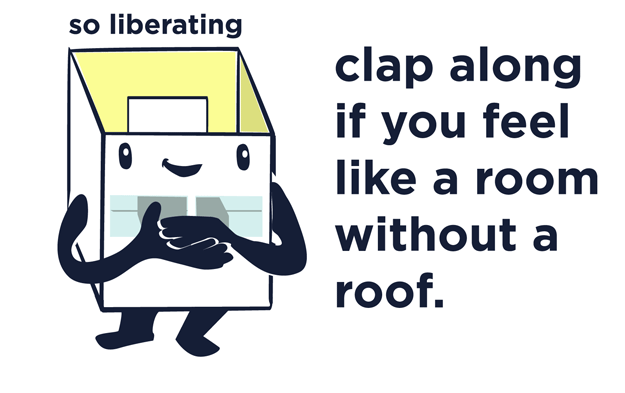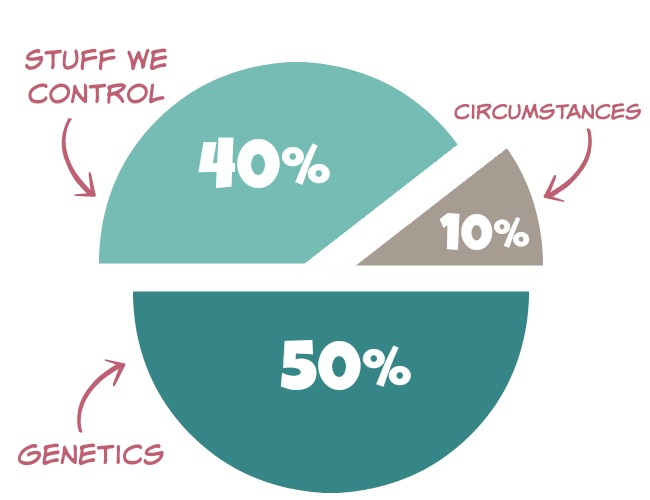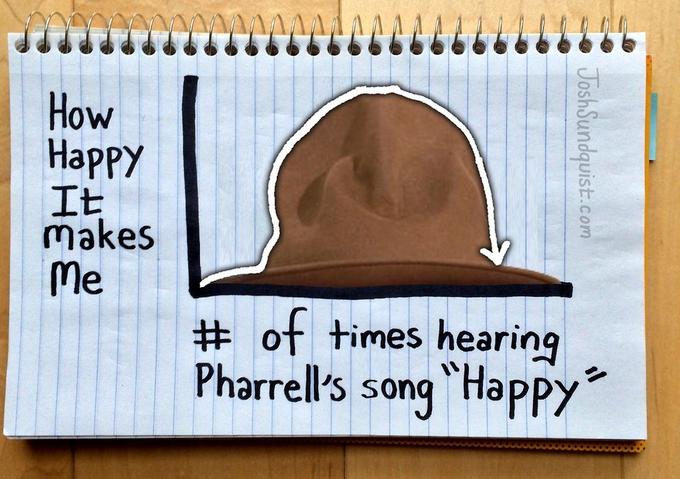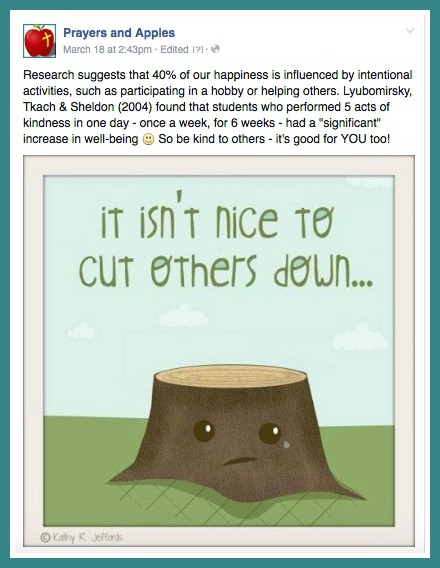There isn’t a single person I’ve talked to about this research who hasn’t been completely surprised, so I’m super excited to share today’s info!
*But first: Gold star to whoever bet I couldn’t go more than two sentences in a happiness post without using a Pharrell/Happy Song meme:
 Sorry, I held off as long as I could! :)
Sorry, I held off as long as I could! :)
50-40-10
So here’s the deal: Research suggests that approximately 50% of our happiness is determined by genetics, 40% by intentional activities and only 10% by circumstances!
That means only 10% of our happiness is based on our job, income, relationship status, health, age, gender, ethnicity or even personal history (such as whether we experienced a childhood trauma or won a prestigious award)!
Am I the only one who expected that number to be a lot higher?!
As researchers Lyubomirsky, Sheldon & Schkade explain,
We believe that these counterintuitively small effects can be largely accounted for by hedonic adaptation and the fact that people adapt rapidly to new circumstances and life events.
For instance, a 1978 study showed that, after only one year, lottery winners were no happier than people who didn’t win the lottery! Likewise, as noted in the American Psychologist: While Americans’ personal income has more than doubled in the past 50 years, their happiness levels have remained the same!
Often referred to as the hedonic treadmill, this principle basically implies that we get used to stuff super fast – so while we may think that landing our dream job will solve all our problems, chances are we’ll end up just as happy as if we got fired.
(But don’t dismay! Remember, the point is: All that stuff only makes up a teeny tiny part of our happiness! You have complete control over roughly four times that amount!)
Currently single? Don’t sweat it! A 15-year study of over 24,000 participants found that, for most people, the life satisfaction benefits derived from getting married tended to fade back to baseline over the years. Which just goes to show: While certain circumstances may seem like they’d solve all our problems, the reality is they usually only provide a short-term boost.
*As a hopeless romantic, I do wanna note that those findings pertain to average trends. Those who “initially reacted strongly” (#soulmates) were still “far from baseline” years later ♥
So how do we get happier?
According to Lyubomirsky, Sheldon & Schkade, engaging in intentional activities influences roughly 40% of our happiness – so the key is finding stuff that’s a good “fit” for our personalities (just because playing baseball makes Bob happier doesn’t mean it will work for you!) and varying our focus and timing of the activities so we don’t get too used to it.
So for instance, if you’re Bob (sorry, I think I have “Jim Bob” stuck in my head from watching one too many episodes of the Duggars!) and playing baseball makes you happy, maybe you play in a local league on some days but on others you coach high school kids or watch a game on TV.
You can also delay adaptation to positive circumstantial changes, such as getting married or winning the lottery, by engaging in intentional effort (remember: that’s the 40% part we control!). For example, newlyweds could try thinking of one new thing they love about their spouse each day; lottery winners could try brainstorming exciting investment opportunities.
Research has also suggested that certain intentional activities may pack more of a happiness punch then others. (Practicing small acts of kindness and keeping a gratitude journal goes a LONG way… but more on that in a later post!)
So moral of the story?
You’re in control!
Don’t let life boss your around!
Like I said, we’ll definitely explore more specific ways to increase happiness in upcoming posts – but for now, I think I’m gonna go engage in a lil intentional happiness myself and watch some more 19 Kids and Counting. #DuggarGroupie #noshame :)
…It’s ridiculous how side-tracked I get writing these posts lol :)
But before I go, I just wanted to say thank you so, so, SO much for…
Over 1,100 Facebook Likes!
And in only three weeks!! :) You guys are seriously the best!! :) I was terrified of starting a Facebook account for the blog (I know it sounds weird, but I’m super private and Facebook makes me like freak out!) but the whole experience has been way more fun than I thought it’d be! I love being able to post quick little tidbits (especially since I’ve been so busy with school) and it gives me the best excuse ever to use all the random cute pictures I find on Instagram ;) #winwin!
So again, thank you guys so, so much!! And if you have a blog or website, please feel free to leave your link in the comments section – I’d love to find more pages to follow now that I’m learning my way around! ♥
And if you haven’t had a chance to check it out yet, you can visit the new Prayers and Apples Facebook page here! :)
Yay! Thanks so much for reading!
Love you guys! ♥
Oh! And some randomness: If you’re interested in the specific studies that led to the 50-40-10 estimates, check out Lyubomirsky, Sheldon & Schkade (2005) as well as the following sources: 1, 2, 3 – about the genetics part – and 1, 2 about circumstances. :)
References
Argyle, M. (1999). Causes and correlates of happiness. In D. Kahneman, E. Diener & N. Schwarz (Eds.), Well-being: The foundations of hedonic psychology (pp. 353–373). New York: Russell Sage Foundation.
Braungart, J.M., Plomin, R., DeFries, J.C. & Fulker, D.W. (1992). Genetic influence on tester-rated infant temperament as assessed by Bayley’s Infant Behavior Record: Nonadaptive and adoptive siblings and twins. Developmental Psychology, 28(1): 40-47.
Brickman, P., & Campbell, D. T. (1971). Hedonic relativism and planning the good society. In M. H. Appley (Ed.), Adaptation-level theory (pp. 287– 302). New York: Academic Press.
Brickman, P., Coates, D. & Janoff-Bulman, R. (1978). Lottery winners and accident victims: Is happiness relative? Journal of Personality and Social Psychology, 36(8): 917-927.
Diener, E., Suh, E.M., Lucas, R.E. & Smith, H.L. (1999). Subjective well-being: Three decades of progress. Psychological Bulletin, 125(2): 276–302.
Lucas, R.E., Clark, A.E., Georgellis, Y. & Diener, E. (2003). Reexamining adaptation and the set point model of happiness: Reactions to changes in marital status. Journal of Personality and Social Psychology, 84(3), 527–539.
Lykken, D. & Tellegen, A. (1996). Happiness is a stochastic phenomenon. Psychological Science, 7(3): 186-189.
Lyubomirsky, S., Sheldon, K.M. & Schkade, D. (2005). Pursuing happiness: The architecture of sustainable change. Review of General Psychology, 9(2): 111-131.
Myers, D. G. (2000). The funds, friends, and faith of happy people. American Psychologist, 55(1): 56–67.
Tellegen, A., Lykken, D.T., Bouchard, T.J. Jr., Wilcox, K.J., Segal, N.L. & Rich, S. (1988). Personality similarity in twins reared apart and together. Journal of Personality and Social Psychology, 54(6): 1031-1039.








I’m HAPPY with this post – great info. Easy to follow
Hahaha :) Thank you! :)
The concept of happiness is really interesting to me. I once delved into The Happiness Project, but was terribly disappointed. Have you ever read that one? Don’t!
That’s awesome about the Facebook likes! I’m really struggling to get more likes to my page. My goal this year is to grow my blog’s FB by double but so far it’s been stagnant. Any tips on that?
I’ve heard about it here and there, but I’ve never had a chance to read it – thanks for the advice! And thanks for the FB kudos :) It’s funny, but I’ve found telling people about it offline (in real life! lol) has really helped! I think guest blogging/being published other places helps too – it lets people find you a little easier :) I’ll let you know if I think of any other tips! Thanks for reading! xo
I love you blog
Thank you so much! So glad you stopped by!